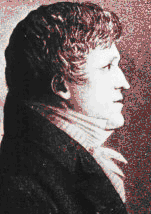Eugène-Casimir Villatte
Eugène-Casimir Villatte (born April 14, 1770 in Longwy , † May 14, 1834 in Nancy ) was a French Général de division of the infantry .
Life
Villatte joined the royal army as a cadet and was soon able to distinguish himself through courage and bravery. At the beginning of the revolution he was already Sous-lieutenant and in 1795 he came as aide-de-camp of Marshal Jean-Baptiste Bernadotte in his staff.
In 1803 Villatte was promoted to Général de brigade and was part of the staff of Marshal Michel Ney . As such he fought u. a. near Ulm (October 16/19, 1805).
Under the leadership of Louis-Nicolas Davout he took part in the fighting near Jena (October 14, 1806) and under Joachim Murat he fought near Lübeck (November 6, 1806). During the battles in front of Preussisch Eylau (February 7/8, 1807) and Guttstadt-Deppen (June 5/6, 1807) he was back on Murat's staff.
After further promotions, Villatte helped from November 1808 to enforce the Napoleonic policy in Spain . Under the leadership of Marshal Claude-Victor Perrin called Victor he fought at Valmaseda (November 5, 1808) and the Battle of Espinosa de los Monteros (November 10-11, 1808). He took part in the fighting at Uclés (January 13, 1809), Medellin (March 28, 1809), Talavera (July 27/28, 1809) and Ocaña (November 19, 1809).
Under the leadership of Maréchal de France Nicolas Jean-de-Dieu Soult , he fought off Badajoz (March / April 1812) and Vitoria (March 21, 1813). In the battle of the Pyrenees (July / August 1813) he was just as brave as in the battles at Bidassoa (7 October 1813), at Nivelle (10 November 1813) and at Nive (9/13 December 1813) .
After the battles at Orthez (February 27, 1814) and Toulouse (April 10, 1814) Villatte was able to return to France.
After the battle of Paris (March 30, 1814) and the abdication of Napoleon (→ Treaty of Fontainebleau ) Villatte became a supporter of King Louis XVIII. Even during Napoleon's “ Rule of the Hundred Days ” he remained a loyal supporter of the Bourbons . During the restoration he acted a. a. as inspector general of the infantry. After the July Revolution of 1830 , Villatte resigned from all offices and settled in Nancy. He died four weeks after his 64th birthday on May 14, 1834 and found his final resting place in the local cemetery.
Honors
- Grand Cross of the Legion of Honor
- Comte de l'Émpire
- His name can be found on the north pillar (2nd column) of the triumphal arch on Place Charles-de-Gaulle ( Paris ).
literature
- Michael Glover: The peninsular was. 1807-1814 . Penguin, London 2001, ISBN 0-14-139041-7 .
- Charles Mullié: Biography of the célébrités militaires des armées de terre et de mer de 1789 à 1850 . Poignavant, Paris 1851 (2 vols.).
- Georges Six: Dictionnaire biographique des généraux & des amiraux français dee la Reévolution et de l'Émpire. 1792-1814 . Saffroy, Paris 1999, ISBN 2-901541-06-2 (reprint of the Paris 1934 edition).
- Digby Smith : The Greenhill Napoleonic Wars Data Book . Greenhill, London 1998, ISBN 1-85367-276-9 .
Web links
| personal data | |
|---|---|
| SURNAME | Villatte, Eugène-Casimir |
| BRIEF DESCRIPTION | French general of the infantry |
| DATE OF BIRTH | April 14, 1770 |
| PLACE OF BIRTH | Longwy |
| DATE OF DEATH | May 14, 1834 |
| Place of death | Nancy |
